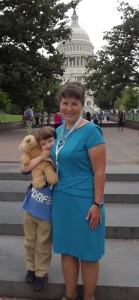Meet Mary, the Advocacy Team Chair for Vermont

Last week we kicked off the start of a new blog series highlighting the stories of our volunteer Advocacy Team Chairs (ATC) from across the country. Today we feature Mary, the ATC for Vermont.
Mary McQuillen is one of the Advocacy Team Chairs for JDRF’s Northern New England Branch where she represents the state of Vermont. Her commitment to curing type 1 diabetes (T1D) began when her now eight-year-old daughter Victoria was diagnosed in 2010 at the age of four. As soon as Victoria was diagnosed, Mary asked the hospital how she could help and was directed to JDRF.
Starting out with a walk team named “Victory Victoria,” Mary steadily became more involved with JDRF. At first, she was uncertain what it meant to be a JDRF Advocate and was concerned it involved a lot of money and time, but she discovered the power of advocacy after her daughter was selected to be Vermont’s Children’s Congress representative in 2013. She met with her U.S. Senators and Representative with her daughter and felt so proud watching Victoria sing the Promise to Remember Me song with the other delegates.
“I can’t write bionic pancreas algorithms, encapsulate beta cells, or donate a million dollars,” Mary said. “But I can educate myself and share my knowledge with my representatives. Advocacy is my vehicle to do something…It has empowered me and I see it empowering my daughters.” Her advice to those wanting to get involved is to not be afraid of advocacy like she once was because it can be a small commitment that is so rewarding.
One rewarding moment was when Mary’s family watched CSPAN during a vote including the Special Diabetes Program (SDP). “It was funny to think of watching CSPAN with my kids like it was a sporting event,” Mary said. “When the bill passed, we were all hooting and hollering. I felt like, ‘we did this!’”
When the National Institutes of Health provided grants for bionic pancreas research, Mary saw the impact of her work for JDRF. “I had part of a bionic pancreas that was dosing my child in my hand, and just heard that the SDP, which I had been spending my time advocating for, was providing some of the funding which was going to get this amazing tool to market,” Mary said. “My advocacy had come full circle in a very personal way and I felt a deep sense of satisfaction. Any doubt I had had that advocacy matters was wiped away.”
Her six-word advocacy memoir is simple:
Voices together.
Affecting change.
Type None.